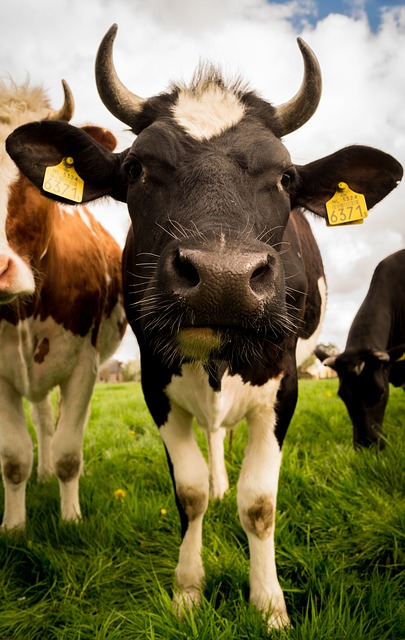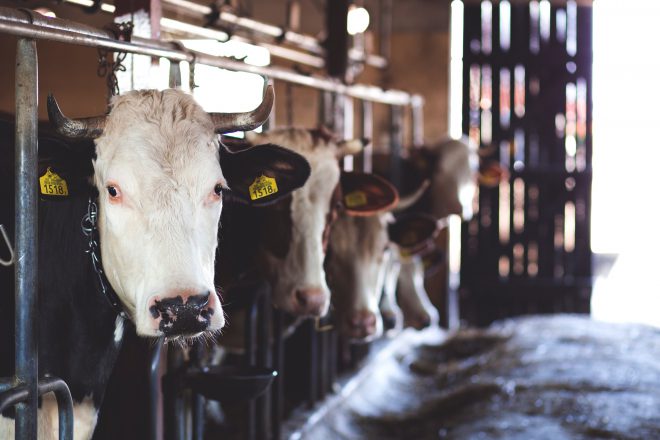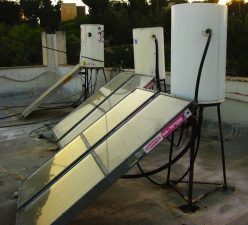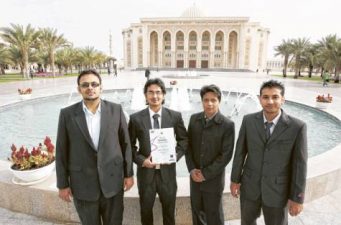Although enlightened people are turning to more sustainable sources of protein (like our vegewarian recipes), it’s not likely that the human hunger for meat and milk will ever go away. While dairy and meat industries continue expanding to meet market demands, the manure of cows, sheep, pigs, goats and camels continues raising the levels of land and water pollution.
Livestock gases significantly raise greenhouse gas levels that contribute to global warming. Some efforts have been made to reduce cattle gases by putting herbs that reduce flatulence in their feed – no great success.
And what of that by-product, manure? Most often, it gets dumped into local waterways or shoveled into piles and left to decompose. Statistics show that in the US alone, livestock produces over a billion tons of waste every year.
Livestock manure has traditionally been used as fuel. Some companies have extracted biogas from it, but as the amounts of waste increase globally, so does the need for a more efficient treatment system. Sustainable Green Technologies (SG Tech) is an Israeli start-up that addresses the issue with an out-of-the-box attitude and a promising new technology.
Daniel Madar, a reusable energy specialist working with SG Tech says,
“You can take cow manure and use the material as fertilizer without any prior treatment, but when you turn the material into biogas, you get two or three products out of one raw material. When you take the manure and treat it, you solve the problem of smell and contamination, and then you get energy plus fertilizer.”
The drawback of biogas production up till now has been that it’s time-consuming and creates an unusable side-product, digestate. That’s the water that remains after treating waste, containing high levels of nutrients and salt. It’s not irrigation-safe. What to do with it? Pouring it into the sewage system could overload water-treatment facilities to the point of collapse, Madar forecasts. And purifying digestate too expensive to consider.
Spraying digestate onto fields only harms them. “It can be used as a fertilizer because it has a lot of nutrients in it. However, it is too concentrated, and the result is that this digestate seeps into water aquifers, pollutes them and causes salinization of the fields,” Madar explains.
Reuven Eitan, IP and PR manager at SG Tech adds: “SG Tech is producing biogas and obtaining 20% more of the methane concentration; thus producing 20% more energy.” SG Tech methods, claims the company, provide a solution that produces “…clean energy, clean water, and nutrient-rich organic compost.”
There’s no denying that biogas also affects the environment. But compare these figures:
The amount of waste that livestock animals produce in the US could potentially create 108.8 billion kilowatt-hours of energy. Greenhouse gases produce could rise to 69.6 million metric tons.
Obtaining the same amount of electricity from coal would produce 109.3 million metric tons of greenhouse gases.
Clearly, biogas is a more reliable and efficient source of fuel than coal, with fewer gases produced. SG Tech also claims that the amount of digestate produced by their system is minuscule compared to that created by current waste treatment.
In 2015, Israel’s agriculture produced 2.26 million metric tons of gases; 2.8% of all greenhouse gases.
Realistically, the world can’t rely only on livestock waste for fuel needs. Madar estimates that in Israel, and likely in other countries, biogas from waste would account for 7% of energy produced.
“It’s not really a replacement for coal or natural gas or petroleum. However, if we use this waste to produce energy, we can reduce the cost of getting rid of this waste, and we can turn it into something more green and more sustainable,” he says. He adds that this new technology is the only one that can handle the waste treatment of cow sheds that hold up to 2,000 cows. Medium-sized dairies could fuel themselves using it.
The SG Tech system has already been tested in several dairies. There are now plans to install it in 10 medium-sized cowsheds in Israel and across the world by the end of 2020.

::Via ZAVIT, Science and Environment News Agency.




